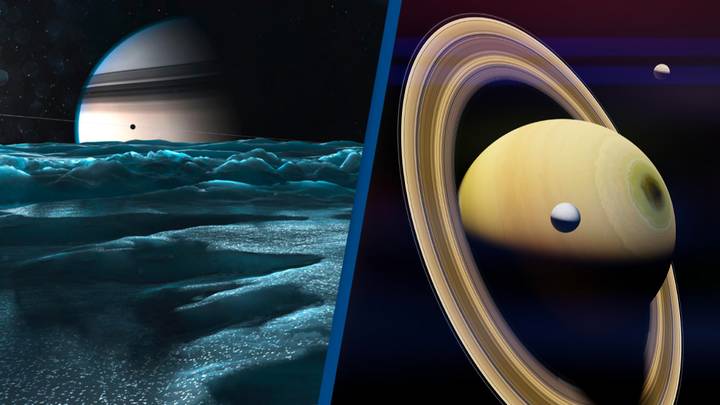
Saturn's Moon Enceladus is Habitable Confirms Stellar Study
Share
Ground-breaking research reveals the presence of high levels of phosphorus in the ocean spray of Saturn's moon Enceladus, marking the first-ever detection of this vital ingredient for life in extra-terrestrial seawater, according to a recent study.
The findings suggest that Enceladus possesses the necessary materials to support life as we know it and also raise the possibility that phosphorus may exist in other distant ocean worlds, such as Neptune's moon Triton or the dwarf planet Pluto. While it remains uncertain whether any of these locations are inhabited by aliens, these new results provide further evidence that habitable conditions may be widespread within our solar system and potentially beyond it.
Enceladus may be a small icy world measuring approximately 650km in diameter, but its subterranean ocean is tantalizingly intriguing. Although hidden beneath the moon's icy shell, geysers on the surface eject plumes of seawater into space. NASA's Cassini spacecraft, which concluded its mission in 2017, fortuitously captured frozen samples of this lunar seawater during its final orbits around Saturn, providing an unprecedented glimpse into the contents of an extra-terrestrial ocean.
Researchers, led by planetary scientist Frank Postberg from Freie Universität Berlin, have now discovered abundant supplies of phosphorus salts, specifically sodium phosphates, within ice grains retrieved by Cassini from Saturn's outer E-ring. This ring primarily receives materials from Enceladus' plumes. Moreover, the team observed that phosphate concentrations in Enceladus' ocean are 100 times higher than in Earth's marine habitats, suggesting an abundance of this vital element in the moon's subsurface sea.
"Enceladus was already considered a pretty habitable place before this," explains Postberg. "The conditions in the ocean seem to be good for life. There are very likely hydrothermal vent systems at the bottom of the ocean that would be an energy source, so you don't need sunlight. There is a rich variety of organic compounds we detected previously in the ice and vapor that is emitted in the plume."
Phosphorus had been the missing ingredient in Enceladus' potential for life. Its discovery has now satisfied what is widely regarded as the strictest requirement for habitability and implies that "Enceladus' ocean could be a harbinger of high phosphorus availability in subsurface oceans across most of the outer Solar System," as outlined in the team's study published in Nature.
Postberg and his colleagues spent years analyzing data collected by Cassini's Cosmic Dust Analyzer (CDA), an instrument not designed for detecting life but capable of examining the properties and compositions of extremely small particles with exceptional precision.
The identification of sodium phosphates was an unexpected surprise, according to Postberg. However, the high concentrations of these compounds in Cassini's samples raised questions about why phosphorus is so much more abundant in Enceladus' ocean compared to Earth's seas.

To shed light on this mystery, Postberg's team recreated an environment similar to Enceladus' in laboratory conditions using simulated ocean water and mineral-rich rocks. These experiments suggest that Enceladus has a "soda ocean" rich in carbonates, which accelerate the dissolution of phosphorus from rocks into the marine environment.
Such soda oceans may be prevalent in celestial bodies that formed beyond a boundary known as the carbon dioxide (CO2) snowline, marking the point where CO2 freezes into ice. Consequently, planetary bodies that originate in these outer regions often contain substantial amounts of CO2 ice, eventually serving as a source of carbonates for soda oceans, similar to Enceladus.
"A soda ocean where you have a lot of carbonates allows the release of phosphate from the rock into the ocean and with that, makes it available for the formation of life," explains Postberg. "It's much harder, or almost impossible, for life to release the phosphate from the rock, but if it's dissolved in the ocean, that's a critical thing for habitability."
He adds, "This has implications beyond Enceladus. If there are ocean moons elsewhere, far away from the Sun where they had CO2 as a building material, then these oceans should be rich in phosphate as well. This is generally good news for habitability in the universe, but specifically for the ocean worlds in our solar system."
In essence, Enceladus is the first extra-terrestrial world known to harbor marine phosphates, but it may not be the last. Jupiter's moons, including Europa and Ganymede, are among the numerous celestial bodies that could also possess habitable oceans. To explore these possibilities, the European Space Agency has recently launched the JUICE spacecraft to investigate Jupiter's moons, while NASA's Europa Clipper mission is scheduled to depart for Europa in 2024.
Scientists have proposed new missions to Enceladus equipped with life-detection instruments, although these concepts have not yet received approval. However, if we do return to this small Saturnian moon in the future, we might finally answer one of the most sensational mysteries in science: Are we alone in the universe?
Postberg asserts, "We could build a spacecraft with today's technology and send it to Enceladus to answer the question: Is this habitable place actually inhabited or not? So with the next mission, we will very likely get an answer to that question."
ARSE Jnr
The section where we explain the above to 5-year-olds (and Flat Earthers).

Scientists have discovered something very interesting on a moon called Enceladus, which goes around the planet Saturn. They found a special ingredient that is important for life, just like the ingredients we need to live. This is the first time they have found this ingredient in the water of another world in space. It means that this moon could have the right things for living things to exist there, like how we live on Earth. It also suggests that other places in space, like another moon of Neptune or a small planet called Pluto, might have this ingredient too.
Enceladus is a small icy world, but it has a hidden ocean of water under its icy surface. Sometimes, the water from this ocean shoots up into space like a big fountain. A spaceship called Cassini was lucky to collect some of this frozen water before it finished its mission. Scientists studied the frozen water and found a lot of a special substance called phosphorus in it. They also discovered that there is much more phosphorus in Enceladus' ocean than there is in the oceans on Earth.
Phosphorus is an important ingredient for life. It helps with many things that living things need to do, like giving us energy and keeping our bodies working properly. Before this discovery, scientists knew that Enceladus had most of the things needed for life, but they were missing phosphorus. Now that they have found it, they are even more sure that Enceladus might be able to support life. But they don't know if there are any living things there yet.
Scientists have been studying the data collected by the Cassini spaceship for a long time. They found the phosphorus using a special instrument on the spaceship. It was a big surprise for them to find it, but now they want to understand how it got there. They think that Enceladus has a special kind of ocean that helps release the phosphorus from rocks into the water. This kind of ocean might exist in other places too, which is exciting because it means there could be more places where life could exist.
Scientists are planning more missions to study Enceladus and other places with water in space. They want to learn more and find out if there really are living things on these moons and planets. It's a very exciting question that we might be able to answer soon!
You’ve come this far…
Why not venture a little further into A.S.S. - our exclusive Australian Space Society.
And keep thrusting Australia into the deep unknown…
#Space_Aus




